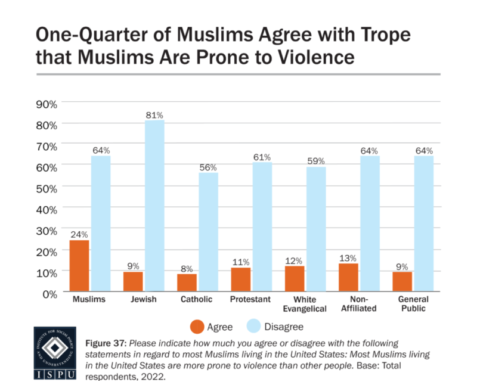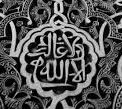
I have always liked data. Numbers and facts are an important way to anchor my thinking on the world.
So I was excited to read over the Institute for Social Policy and Understanding new poll on American Muslims. Most results are unsurprising. American Muslims tend to be more religious than many other faiths (“second only to white Evangelicals (83%)”). and they are far more likely to identify as independents and Democrats, as opposed to Republican.
But the most interesting part of the report is what it says about the rise of what it calls “Islamophobia” among the Muslim Americans. In fact, while Islamophobia declined among other groups, it has increased among Muslims. Indeed, according to its findings, Muslims tend to be more Islamophobic than all the other groups except Evangelicals and Catholics.
The report tries to make sense of this unexpected finding in terms of what it calls “internalized oppression,” a theory according to which minorities “internalize the negative stereotypes.” This is why, the report suggests, younger Muslim Americans who were born after 9/11/2001 were more likely to harbor Islamophobic beliefs, since they grew up in “a country that has demonized their identity in popular culture, news media, political rhetoric, and in policy. Research suggests that this kind of steady drum- beat of bigoted ideas and state actions have a detrimental impact on the target group’s self-image and mental health.”
The authors speculate that “internalized prejudice may actually be a defense mechanism against the trauma of bigotry at the hands of the dominant group by agreeing with those in power but believing one has the choice (locus of control) to not be like those tropes.”
I don’t buy this explanation. I think something else is going on, something I see among some of my children’s friends. Let me explain.
First, the authors are silent about how Muslim Americans may have strong sentiments about fellow Muslims who do bad things in our name. The report mentions 9/11 only in the context of the ensuing Islamophobia without addressing how Muslim Americans perceived the fanatics who attacked America in the name of our religion. In a way, Islamic extremists have done far more damage to Muslims’ self-image than any external Islamophobia. Think about the rise of ISIS, the recent sectarian killings in New Mexico, or even the attack last month on Salman Rushdie.
More than self-image is at stake. Far more Muslims have been killed by fellow Muslims than Islamophobes.
Second, I think there is a generational shift going in America. The 9/11 era is over. Between the Ukraine war, the menace of Russia and China, there are new sources of fear for Americans – and thankfully it’s not us. Now that the US withdrew from Afghanistan, and the Iraq War long over, most Americans have moved on. Plus, if you look around, in tv shows, news, media there are Muslim Americans popping up everywhere. Our existence is being normalized by the weight of time. The key people who haven’t caught on this – or don’t want to – are the beneficiaries from the Islamophobia industry, like the authors of the study above and Nihad Awad to name a few.
Most Muslim Americans live peacefully with the rest of our fellow Americans. But that is not to say that our community does not have serious problems. Key among these is that we have allowed our most prominent spokespeople to themselves entrench unfortunate stereotypes in the public imagination.
I hope my children’s generation can be proud of their Muslim identity and also critical of fellow Muslims who try to manipulate that identity for their own extremist and divisive agenda. I worry that otherwise they may become self-hating, which would be a disaster.
